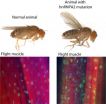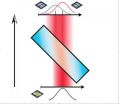(Press-News.org) University of Leicester psychologists have made an analysis of Richard III's character – aiming to get to the man behind the bones.
Professor Mark Lansdale, Head of the University's School of Psychology, and forensic psychologist Dr Julian Boon have put together a psychological analysis of Richard III based on the consensus among historians relating to Richard's experiences and actions.
They found that, while there was no evidence for Shakespeare's depiction of Richard III as a psychopath, he may have had "intolerance to uncertainty syndrome" – which may have manifested in control freak tendencies.
The academics presented their findings on Saturday, March 2 at the University of Leicester.
Their analysis aims to humanise Richard – to flesh out the bones and get to the character of the man who became one of the most controversial kings in English history.
Firstly, they examined one of the most persistent and critical depictions of Richard's personality – the suggestion that he was a murdering psychopath. This reputation – portrayed most famously in Shakespeare's play – does not seem to have any basis in the facts we have about his life.
He showed little signs of the traits psychologists would use to identify psychopaths today – including narcissism, deviousness, callousness, recklessness and lack of empathy in close relationships.
However, the academics speculate that Richard may have exhibited a common psychological syndrome know as an intolerance to uncertainty.
Professor Mark Lansdale said: "This syndrome is associated with a need to seek security following an insecure childhood, as Richard had. In varying degrees, it is associated with a number of positive aspects of personality including a strong sense of right and wrong, piety, loyalty to trusted colleagues, and a belief in legal processes - all exhibited by Richard.
"On the negative side it is also associated with fatalism, a tendency to disproportionate responses when loyalty is betrayed and a general sense of 'control freakery' that can, in extreme cases, emerge as very authoritarian or possibly priggish. We believe this is an interesting perspective on Richard's character."
In addition, the pair examined how his disability – evident in the curvature of the spine of the King's remains – may have had an impact on his character - and specifically on the way he interacted with people who he did not know well.
In medieval times, deformation was often taken as a visible indication of a twisted soul. As a result, it is possible that this would have made him cautious in all his interactions with others.
Professor Lansdale added: "Overall, we recognise the difficulty of drawing conclusions about people who lived 500 years ago and about whom relatively little is reliably recorded; especially when psychology is a science that is so reliant upon observation.
"However, noting that this is the problem historians work with as a matter of routine, we argue that a psychological approach provides a distinct and novel perspective: one which offers a different way of thinking about the human being behind the bones."
INFORMATION:
Notes
For more information, please contact Professor Mark Lansdale on 0116 229 7121 or at: ml195@le.ac.uk
The Search for Richard III press pack: http://www2.le.ac.uk/offices/press/media-centre/richard-iii
Was King Richard III a control freak?
University of Leicester psychologists believe Richard III was not a psychopath -- but he may have had control freak tendencies
2013-03-04
ELSE PRESS RELEASES FROM THIS DATE:
International aid and advocacy groups are influenced by their home countries' cultures
2013-03-04
In February, Greenpeace activist and actress Lucy Lawless, star of "Xena: Warrior Princess," was sentenced to 120 hours of community service for boarding a Shell oil rig to protest offshore Arctic drilling. Dramatic protests by Netherlands-based Greenpeace contrast sharply with the lobbying and letter-writing of the U.S.-based Sierra Club. The differences among those two groups and other international non-governmental organizations (INGOs) reflect the cultures of the nations where they are based, according to research by a University of Missouri political scientist. Individuals ...
Vortex loops could untie knotty physics problems
2013-03-04
University of Chicago physicists have succeeding in creating a vortex knot—a feat akin to tying a smoke ring into a knot. Linked and knotted vortex loops have existed in theory for more than a century, but creating them in the laboratory had previously eluded scientists.
Vortex knots should, in principle, be persistent, stable phenomena. "The unexpected thing is that they're not," said Dustin Kleckner, a postdoctoral scientist at UChicago's James Franck Institute. "They seem to break up in a particular way. They stretch themselves, which is a weird behavior."
This behavior ...
Solutions Real Estate's Massive Success and Continued Growth is the Hottest Topic in San Diego Real Estate News Today
2013-03-04
Matt Johnson fell in love with San Diego in 1998, and has resided here ever since.
He is familiar with the local neighborhoods inside and out, and has the ability to assist you in selecting the best one for your family's needs.
Matt got his start in real estate at the age of 9, helping his Dad turn dilapidated old houses into the gem of the neighborhood. He later continued on that tradition, becoming a professional home renovator with operations in two states. Several years later, he realized his passion was in the sales and marketing side, so he obtained his license ...
Researchers discover how to shutdown cancer's powerful master protein
2013-03-04
NEW YORK (March 3, 2013) -- The powerful master regulatory transcription factor called Bcl6 is key to the survival of a majority of aggressive lymphomas, which arise from the B-cells of the immune system. The protein has long been considered too complex to target with a drug since it is also crucial to the healthy functioning of many immune cells in the body, not just B cells gone bad.
But now, in the journal Nature Immunology, researchers at Weill Cornell Medical College report that it is possible to shut down Bcl6 in the cancer, known as diffuse large B-cell lymphoma ...
7 genetic risk factors found to be associated with common eye disorder
2013-03-04
An international group of researchers has discovered seven new regions of the human genome—called loci—that are associated with increased risk of age-related macular degeneration (AMD), a leading cause of blindness. The AMD Gene Consortium, a network of international investigators representing 18 research groups, also confirmed 12 loci identified in previous studies. The findings are reported online today in the journal Nature Genetics. Supported by the National Eye Institute (NEI), a part of the National Institutes of Health, the study represents the most comprehensive ...
Scientists identify 'clean-up' snafu that kills brain cells in Parkinson's disease
2013-03-04
March 3, 2013— (Bronx, NY) — Researchers at Albert Einstein College of Medicine of Yeshiva University have discovered how the most common genetic mutations in familial Parkinson's disease damage brain cells. The study, which published online today in the journal Nature Neuroscience, could also open up treatment possibilities for both familial Parkinson's and the more common form of Parkinson's that is not inherited.
Parkinson's disease is a gradually progressing disorder of the nervous system that causes stiffness or slowing of movement. According to the Parkinson's ...
Adding to the list of disease-causing proteins in brain disorders
2013-03-04
PHILADELPHIA – A multi-institution group of researchers has found new candidate disease proteins for neurodegenerative disorders. James Shorter, Ph.D., assistant professor of Biochemistry and Biophysics at the Perelman School of Medicine, University of Pennsylvania, Paul Taylor, M.D., PhD, St. Jude Children's Research Hospital, and colleagues describe in an advanced online publication of Nature that mutations in prion-like segments of two RNA-binding proteins are associated with a rare inherited degeneration disorder affecting muscle, brain, motor neurons and bone (called ...
Getting around the Uncertainty Principle
2013-03-04
Researchers at the University of Rochester and the University of Ottawa have applied a recently developed technique to directly measure for the first time the polarization states of light. Their work both overcomes some important challenges of Heisenberg's famous Uncertainty Principle and also is applicable to qubits, the building blocks of quantum information theory.
They report their results in a paper published this week in Nature Photonics.
The direct measurement technique was first developed in 2011 by scientists at the National Research Council, Canada, to measure ...
Cancer vaccines self-sabotage, channel immune attack to injection site
2013-03-04
HOUSTON – Cancer vaccines that attempt to stimulate an immune system assault fail because the killer T cells aimed at tumors instead find the vaccination site a more inviting target, scientists at The University of Texas MD Anderson Cancer Center report in Nature Medicine.
A common substance used in many cancer vaccines to boost immune attack betrays the cause by facilitating a buildup of T cells at the vaccination site, which then summon more T cells to help with the perceived threat.
"Vaccines stimulate production of T cells primed to attack the target cancer, and ...
2 new genes linked to amyotrophic lateral sclerosis and related disorders
2013-03-04
A study led by St. Jude Children's Research Hospital has discovered mutations in two genes that lead to the death of nerve cells in amyotrophic lateral sclerosis (ALS), also known as Lou Gehrig's disease, and related degenerative diseases.
The same mutation occurred in both genes and led to the abnormal build-up of the proteins inside cells. These proteins play an essential role in normal RNA functioning and have also been linked to cancer, including the Ewing sarcoma, the second most common type of bone cancer in children and adolescents. The finding is the latest in ...
LAST 30 PRESS RELEASES:
Reconstructing the world’s ant diversity in 3D
UMD entomologist helps bring the world’s ant diversity to life in 3D imagery
ESA’s Mars orbiters watch solar superstorm hit the Red Planet
The secret lives of catalysts: How microscopic networks power reactions
Molecular ‘catapult’ fires electrons at the limits of physics
Researcher finds evidence supporting sucrose can help manage painful procedures in infants
New study identifies key factors supporting indigenous well-being
Bureaucracy Index 2026: Business sector hit hardest
ECMWF’s portable global forecasting model OpenIFS now available for all
Yale study challenges notion that aging means decline, finds many older adults improve over time
Korean researchers enable early detection of brain disorders with a single drop of saliva!
Swipe right, but safer
Duke-NUS scientists identify more effective way to detect poultry viruses in live markets
Low-intensity treadmill exercise preconditioning mitigates post-stroke injury in mouse models
How moss helped solve a grave-robbing mystery
How much sleep do teens get? Six-seven hours.
Patients regain weight rapidly after stopping weight loss drugs – but still keep off a quarter of weight lost
GLP-1 diabetes drugs linked to reduced risk of addiction and substance-related death
Councils face industry legal threats for campaigns warning against wood burning stoves
GLP-1 medications get at the heart of addiction: study
Global trauma study highlights shared learning as interest in whole blood resurges
Almost a third of Gen Z men agree a wife should obey her husband
Trapping light on thermal photodetectors shatters speed records
New review highlights the future of tubular solid oxide fuel cells for clean energy systems
Pig farm ammonia pollution may indirectly accelerate climate warming, new study finds
Modified biochar helps compost retain nitrogen and build richer soil organic matter
First gene regulation clinical trials for epilepsy show promising results
Life-changing drug identified for children with rare epilepsy
Husker researchers collaborate to explore fear of spiders
Mayo Clinic researchers discover hidden brain map that may improve epilepsy care
[Press-News.org] Was King Richard III a control freak?University of Leicester psychologists believe Richard III was not a psychopath -- but he may have had control freak tendencies



